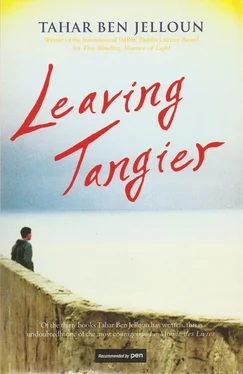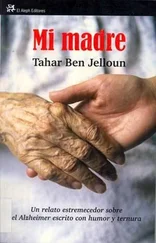Tahar Ben Jelloun - Leaving Tangier
Здесь есть возможность читать онлайн «Tahar Ben Jelloun - Leaving Tangier» весь текст электронной книги совершенно бесплатно (целиком полную версию без сокращений). В некоторых случаях можно слушать аудио, скачать через торрент в формате fb2 и присутствует краткое содержание. Год выпуска: 2009, Издательство: Arcadia Books, Жанр: Современная проза, на английском языке. Описание произведения, (предисловие) а так же отзывы посетителей доступны на портале библиотеки ЛибКат.
- Название:Leaving Tangier
- Автор:
- Издательство:Arcadia Books
- Жанр:
- Год:2009
- ISBN:нет данных
- Рейтинг книги:5 / 5. Голосов: 1
-
Избранное:Добавить в избранное
- Отзывы:
-
Ваша оценка:
- 100
- 1
- 2
- 3
- 4
- 5
Leaving Tangier: краткое содержание, описание и аннотация
Предлагаем к чтению аннотацию, описание, краткое содержание или предисловие (зависит от того, что написал сам автор книги «Leaving Tangier»). Если вы не нашли необходимую информацию о книге — напишите в комментариях, мы постараемся отыскать её.
Leaving Tangier — читать онлайн бесплатно полную книгу (весь текст) целиком
Ниже представлен текст книги, разбитый по страницам. Система сохранения места последней прочитанной страницы, позволяет с удобством читать онлайн бесплатно книгу «Leaving Tangier», без необходимости каждый раз заново искать на чём Вы остановились. Поставьте закладку, и сможете в любой момент перейти на страницу, на которой закончили чтение.
Интервал:
Закладка:
But it was not a dream. Rising, she felt an unfamiliar sense of profound well-being, and even felt like shouting ‘Long live the king!’ Going to look in the bathroom mirror, she saw a radiant face there. It was hers. She was happy, and did not even try to discover the reason for this sudden joy. She ran cold water over her head but decided not to dry her hair; she liked feeling the water drip gently down her chest and shoulders. She was alone, and needed no one else. Later that evening, she watched a rebroadcast of the king’s funeral, followed by scenes of allegiance being pledged to a young man, who was deeply moved by his duty to carry on the centuries-old traditions of his dynasty.
It was then that Kenza felt the hour had come for her to go home at last to Morocco.
40 . Returning
FOR SEVERAL DAYS now a few of them have already been on the move, guided by an irresistible longing to head far away, to put out to sea. They walk along, crossing cities, chilly wastelands, forests, fields. They walk day and night, driven by a force of such unsuspected strength that they feel no fatigue, not even the need to eat and drink. Borne along by winds bound for home, they advance without questions, without wondering what is happening to them. They believe that destiny is there, in that march, drawing them back to their roots, to their native land, a destiny that has appeared to them as a kind of command, an indisputable order, a time outside time, the ascent to a mountaintop, a wonderful promise, a shining dream, pressing on, heading over the horizon. They take to the road, heads high, with a warm breath at their backs: the wind of freedom. Sensing that this is the moment, this is the hour. This is their season, a season for no one but them, for all those who have suffered, who have not found their place in life. Without a single regret, they’ve left everything behind and have already forgotten why they ever left home. They head for the port, where a familiar inner voice tells them to embark on a boat christened Toutia , a modest craft aboard which the captain has planted a flowering tree with a sweet perfume, an orange or a lemon tree.
The captain is a man from another era, a kind of dandy with sideburns and a well-trimmed beard. His body is frail, and he is assisted by a graceful young woman with grey, almond-shaped eyes, a dark complexion, and long brown hair that blows in the wind. Some people claim she’s a countess; others that she’s a fashion model from Brazil; still others believe she is the captain’s wife, for does he not gaze at her with loving eyes? She is there to welcome the new passengers with open arms. Tattoos emblazon her forehead and chin. She places her right hand on the shoulder of the captain, who calls her Toutia the Sublime. And when the captain gives the signal, she sings an Andalusian Arab song in a clear, true voice; the song is suffused with wrenching nostalgia, and her voice breaks with emotion. Toutia closes her eyes and sings with all her heart. Everyone, on the dock as well as the ship, stops to listen to her in silence.
They arrive in scattered little groups. There is pride in their eyes: what they have just accomplished was not simply a duty, but a necessity. Some of them have succumbed to fatigue; it’s nothing, only a touch of rheumatism. In the heat of midsummer, it is the cold of exile, a pernicious chill, that attacks you: you stand up only to find your right leg giving way, that’s how it is, who knows why; the doctor told me it was age but he was lying to me; the mind is fine but the body can no longer keep up. How dare he say that to me, when I’ve been wandering these roads for so long? — but I can see he’s not familiar with this illness that quietly torments us … well, good for him, after all; I feel fine at the moment, I don’t know who I am, but I feel fine, in spite of the doctor’s opinion. I’ve lost my name, I’m told my face is gone — it’s amazing how mean people can be — and my rheumatic pains have disappeared as well. This boat seems both familiar and strange to me: perhaps it isn’t a boat, only a model, some trompe-l’oeil, a simple image projected out onto the water; this is the first time I’ve ever boarded a boat without knowing its destination, which is a beautiful thing, actually… I’ll sail across the waves until the day the last day dawns, until the moment when the Master of the Soul will come to reclaim his due, and as for me, I’m ready, been ready for a long time now, ever since my mother taught me that the great goodbye is nothing and that the only things to fear are sickness and the wickedness of men. A wing will dip down and gather you up to bear you away to other skies, that’s what death is, my son, a dream in which suffering no longer exists.
Miguel walks with a cane. He is still smartly dressed, but his face has an unhealthy tinge and is marked by illness; he advances silently, alone. He, too, is answering the call. Who alerted him? Who told him about this expedition? Miguel put all his affairs in order before leaving his house. No one is aware of what he has meticulously prepared. Everything has been laid out in a letter left to Carmen and Gabriel.
In a few days, a few weeks, perhaps, I’ll be going away. No tears, please, over my condition; I must admit that I’ve been happy, and have experienced some difficult moments as well as extraordinary joys, and today I have no regrets, I leave at peace, with a light heart, asking only one thing of you: that no one should know about the disease that consumes me and will carry me off. I’m counting on your sense of responsibility, your love, and your friendship to ensure that my sendoff will be as beautiful and elegant as my life. Discretion, restraint, dignity, and generosity: that is my wish. I hate noise and bother. On the day when I feel my end coming, I will enter a hospital with ‘bronchitis’ and die in my bed there. You will then be informed, and will come get me even if it’s the middle of the night. Under absolutely no circumstances will you leave me in the morgue, not that I’m afraid of the cold, but it’s a dirty, unsavoury place, and you will take me home immediately, to my old house, and there you will ask my neighbour Lahcen, a religious man and the soul of honesty, to come prepare my body. Next, you will buy flowers, all the flowers you can find in the market of Fès; place them everywhere, burn sandalwood, and whatever you do — do not call a priest: remember that I have become a Muslim. Lastly, invite all my friends, and offer them food and drink.
I have already bought the grave, which is at the Cemetery of the Moujahidin, one hundred tombs to the left as you enter: the site lies beneath a tree on a rise overlooking the city, with a view of the Mountain, the sea, and old Tangier. I like Muslim cemeteries; they’re so much less depressing than the well-organized graveyards of other religions. Muslim cemeteries are simple, humble, and open; life shines on them with a magnificent light. I am not a deeply devout man, you know that, but I respect religions. When I have been laid to rest (I wish no coffin, only a shroud), you will say prayers you have chosen because you love them, and perhaps some poems or Sufi * songs. After that, it will be time for us to say adieu.
As to my estate, my lawyer, Maître García, will keep you informed. One more thing: I ask Gabriel to supervise the studies of Halim and Halima, my children. He knows what I expect of him and has only to carry out my wishes. Regarding Kenza, let him make sure that she receives her rightful inheritance.
Miguel boards the boat unaided, greets the captain, kisses Toutia’s hand, and goes off to rest in a chaise longue in the shade of the tree. There he hears a voice murmur to him, You are in a world where spent passions are marked by a great love that still glitters in the darkness beside the flowers you so cherished, flowers bearing a life overflowing with memories.
Читать дальшеИнтервал:
Закладка:
Похожие книги на «Leaving Tangier»
Представляем Вашему вниманию похожие книги на «Leaving Tangier» списком для выбора. Мы отобрали схожую по названию и смыслу литературу в надежде предоставить читателям больше вариантов отыскать новые, интересные, ещё непрочитанные произведения.
Обсуждение, отзывы о книге «Leaving Tangier» и просто собственные мнения читателей. Оставьте ваши комментарии, напишите, что Вы думаете о произведении, его смысле или главных героях. Укажите что конкретно понравилось, а что нет, и почему Вы так считаете.












